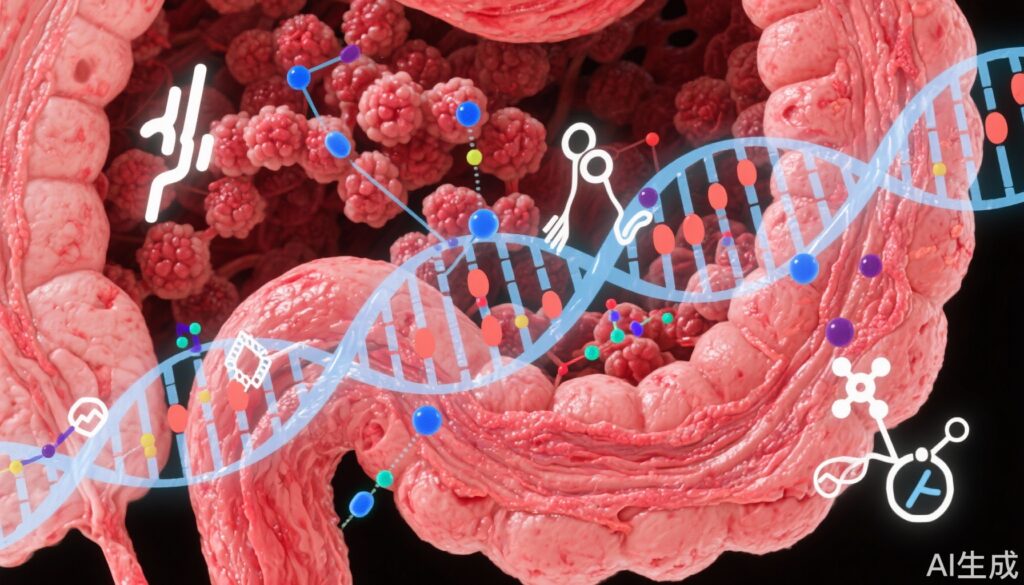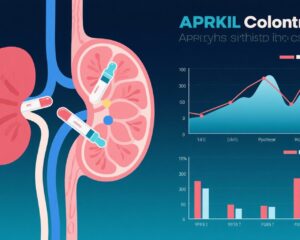Study Background and Disease Burden
Colorectal cancer (CRC) ranks among the leading causes of cancer morbidity and mortality worldwide. Despite advances in surgical and systemic therapies, predicting oncological outcomes remains challenging due to tumour heterogeneity and underlying biological factors. Emerging evidence implicates the gut microbiota—complex microbial communities residing in the intestinal mucosa—in CRC pathogenesis, influencing tumour development, progression, and therapy response. Notably, the tumoral mucosal microbiota may harbor pathobionts—microorganisms that can cause disease under certain conditions—that play roles in oncogenesis and patient prognosis.
This study addresses a critical unmet need to delineate the composition and metabolic functions of the mucosal microbiota within colorectal tumours and examine their influence on post-resection survival outcomes. Understanding these microbial networks could offer novel prognostic biomarkers and therapeutic targets in CRC management.
Study Design
This multicentre, prospective observational cohort study enrolled patients diagnosed with primary colorectal cancer undergoing curative surgical resection in the UK (n = 74) and the Czech Republic (n = 61). The investigation incorporated metataxonomic profiling of the tumour mucosal microbiota using bacterial 16S rRNA gene sequencing, ultra-performance liquid chromatography-mass spectrometry (UPLC-MS) for detailed metabolomic analyses, targeted bacterial quantitative PCR assays, and comprehensive tumour exome sequencing. Hierarchical clustering methods adjusted for clinical and oncological covariates identified distinct bacterial and metabolite clusters associated with CRC. Cox proportional hazards models were employed to evaluate associations between these clusters and disease-free survival over a median follow-up period of 50 months.
Key Findings
Thirteen mucosal microbiota clusters were delineated, with five showing significant differential abundance between tumour and matched normal mucosa. The most notable was cluster 7, enriched with pathobionts Fusobacterium nucleatum and Granulicatella adiacens, strongly associated with tumour tissue (PFDR=0.0002). Intriguingly, tumoral dominance of this cluster independently predicted favorable disease-free survival (adjusted p=0.031), indicating a potential protective or tumor-suppressive microenvironment associated with these bacteria.
Conversely, cluster 1, which comprised commensals such as Faecalibacterium prausnitzii and Ruminococcus gnavus, showed a negative association with cancer (PFDR=0.0009) yet was independently predictive of worse disease-free survival (adjusted p=0.0009). This paradoxical finding suggests complex microbiota-tumour interactions where certain bacteria’s presence might reflect aggressive tumour biology or altered immune responses.
Metabolomic analysis revealed two primary metabolic clusters: Met 1, enriched for medium-, long-, and very-long-chain fatty acids, ceramides, and lysophospholipids, was inversely associated with CRC presence (PFDR=2.61×10-11) and correlated with DNA mismatch-repair deficiency (p=0.005); Met 2, characterized by phosphatidylcholine species, nucleosides, and amino acids, was positively associated with CRC (PFDR=1.30×10-12) but showed no link with survival outcomes.
Exome sequencing identified FBXW7 mutations exclusively in tumours predominated by microbiota cluster 7, highlighting potential gene-microbiota interactions influencing tumour biology and possibly prognosis.
Expert Commentary
This study advances our understanding of CRC tumour microbiota by identifying specific bacterial pathobiont networks correlated with both tumour genetic mutations and metabolic phenotypes, which collectively predict clinical outcomes after surgery. The association of pathobionts like Fusobacterium nucleatum with improved survival contrasts with prior studies linking it to poor prognosis; this may reflect spatial tumor niche distinctions or host immune context. The negative prognostic impact of typical commensals challenges conventional views and underscores the complexity of microbe-host-tumour interplay.
Limitations include observational design and relatively modest cohort sizes, necessitating validation in independent, larger populations with mechanistic studies to dissect causality. Despite these caveats, findings could inform personalized prognostication and microbiota-targeted interventions to optimize CRC therapy.
Conclusion
Distinct pathobiont networks within the colorectal tumour microenvironment are integrally linked to tumour mutation signatures and metabolic subtypes, independently predicting disease-free survival following curative resection. These insights reveal the tumour microbiota’s prognostic utility and suggest potential therapeutic avenues targeting microbial communities to improve CRC patient outcomes.
References
- Alexander JL, Posma JM, Scott A, et al. Pathobionts in the tumour microbiota predict survival following resection for colorectal cancer. Microbiome. 2023;11(1):100. doi:10.1186/s40168-023-01518-w.
- Garrett WS. Cancer and the microbiota. Science. 2015;348(6230):80-86. doi:10.1126/science.aaa4972.
- Kostic AD, Chun E, Robertson L, et al. Fusobacterium nucleatum potentiates intestinal tumorigenesis and modulates the tumor-immune microenvironment. Cell Host Microbe. 2013;14(2):207-215. doi:10.1016/j.chom.2013.07.007.


